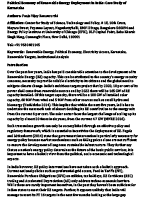 |
Title: Political Economy of Renewable Energy Deployment in India: Case Study of Karnataka Synopsis: Over the past few years, India has paid considerable attention to the development of its Renewable Energy (RE) capacity. This can be attributed to the country’s energy security concerns, necessity to provide reliable electricity to its citizens and the global need to mitigate climate change. |
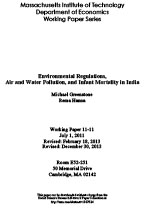 |
Title: Environmental Regulations, Air and Water Pollution, and Infant Mortality in India Synopsis: Using the most comprehensive developing country dataset ever compiled on air and water pollution and environmental regulations, the paper assesses India’s environmental regulations with a difference-in-differences design. The air pollution regulations are associated with substantial improvements in air quality. |
 |
Title: Weather and Death in India: Mechanisms and Implications for Climate Change Synopsis: This paper reveals a stark inequality in the effect of ambient temperatures on death in human populations. Using district-level daily weather and annual mortality data from 1957 to 2000, we find that hot days lead to substantial increases in mortality in rural but not urban India. Despite being far poorer, the mortality response in urban India is not dissimilar to that in the US over the same period. |
 |
Title: The Value of Regulatory Discretion: Estimates from Environmental Inspections in India Synopsis: In collaboration with a state environmental regulator in India, we conducted a field experiment to raise the frequency of environmental inspections to the prescribed minimum for a random set of industrial plants. The treatment was successful when judged by process measures, as treatment plants, relative to the control group, were more than twice as likely to be inspected and to be cited for violating pollution standards. |
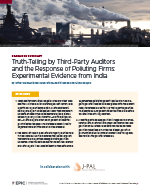 |
Synopsis: In many regulated markets, private, third-party auditors are chosen and paid by the firms that they audit, potentially creating a conflict of interest. This paper reports on a two-year field experiment in the Indian state of Gujarat that sought to curb such a conflict by altering the market structure for environmental audits of industrial plants to incentivize accurate reporting. |
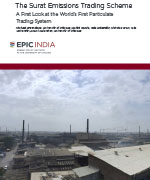 |
Synopsis: In the coming years, India must meet the twin challenges of achieving rapid economic growth and cleaning up the environment. To do so, India needs environmental regulation that is highly effective while imposing minimal costs on industry. Unlike existing commandand-control regulations that impose high costs, provide no flexibility, and are enforced by costly and time-consuming criminal penalties, Emissions Trading Schemes (ETS) provide a transformative alternative with a track record of success around the world. |
 |
Synopsis: It is conventional wisdom that it is possible to reduce exposure to indoor air pollution, improve health outcomes, and decrease greenhouse gas emissions in rural areas of developing countries through the adoption of improved cooking stoves. This is largely supported by observational field studies and engineering or laboratory experiments. However, we provide new evidence, from a randomized control trial conducted in rural Orissa, India (one of the poorest places in India) on the benefits of a commonly used improved stove that laboratory tests showed to reduce indoor air pollution and require less fuel. |
 |
Title: The Consequences of Treating Electricity as a Right Synopsis: High-income countries take electricity for granted: people know the lights will switch on twenty-four hours a day, 365 days a year. In developing countries, nearly a billion people are not connected to the electricity grid, and those who are receive partial and intermittent power supply. We argue that these shortfalls arise as a consequence of treating electricity as a right, rather than as a private good. |
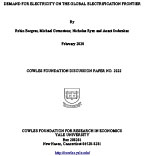 |
Title: Demand for Electricity on the Global Electrification Frontier Synopsis: Nearly a billion people, mostly in rural Africa and South Asia, do not have electricity at home. The advent of off-grid solar power means that many of these households, at the frontier of global electrification, have a choice between competing sources of electricity. This paper studies the demand for electricity with a discrete choice model wherein households choose between grid electricity, several off-grid electricity sources, and having no electricity at all. |
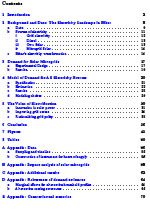 |
Title: Demand for Electricity in a Poor Economy Synopsis: Over a billion people do not have electricity and many others have abysmal power supply. Innovation has cut the price of solar photovoltaic panels to that point that off-grid solar power can compete with traditional, grid electrification to light the homes of the rural poor. We collected data over four years in Bihar, India, as the state underwent a transformation that raised electrification rates nearly 40 percentage points. We use a randomized experiment to estimate a demand model wherein households choose between grid electricity, off-grid electricity sources and having no electricity at all. |
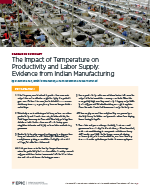 |
Synopsis: Hotter years are associated with lower economic output in developing countries. We show that the effect of temperature on labor is an important part of the explanation. Using microdata from selected firms in India, we estimate reduced worker productivity and increased absenteeism on hot days. Climate control significantly mitigates productivity losses. View Pubication, Download Research Highlight, Download Working Paper |
 |
Synopsis: This paper provides field evidence from India examining changes in electricity consumption in response to various behavioral interventions. I study the impact of (i) weekly reports with peer comparisons of electricity use; (ii) reports augmented with monetary incentives to reduce consumption and (iii) price variation. |


